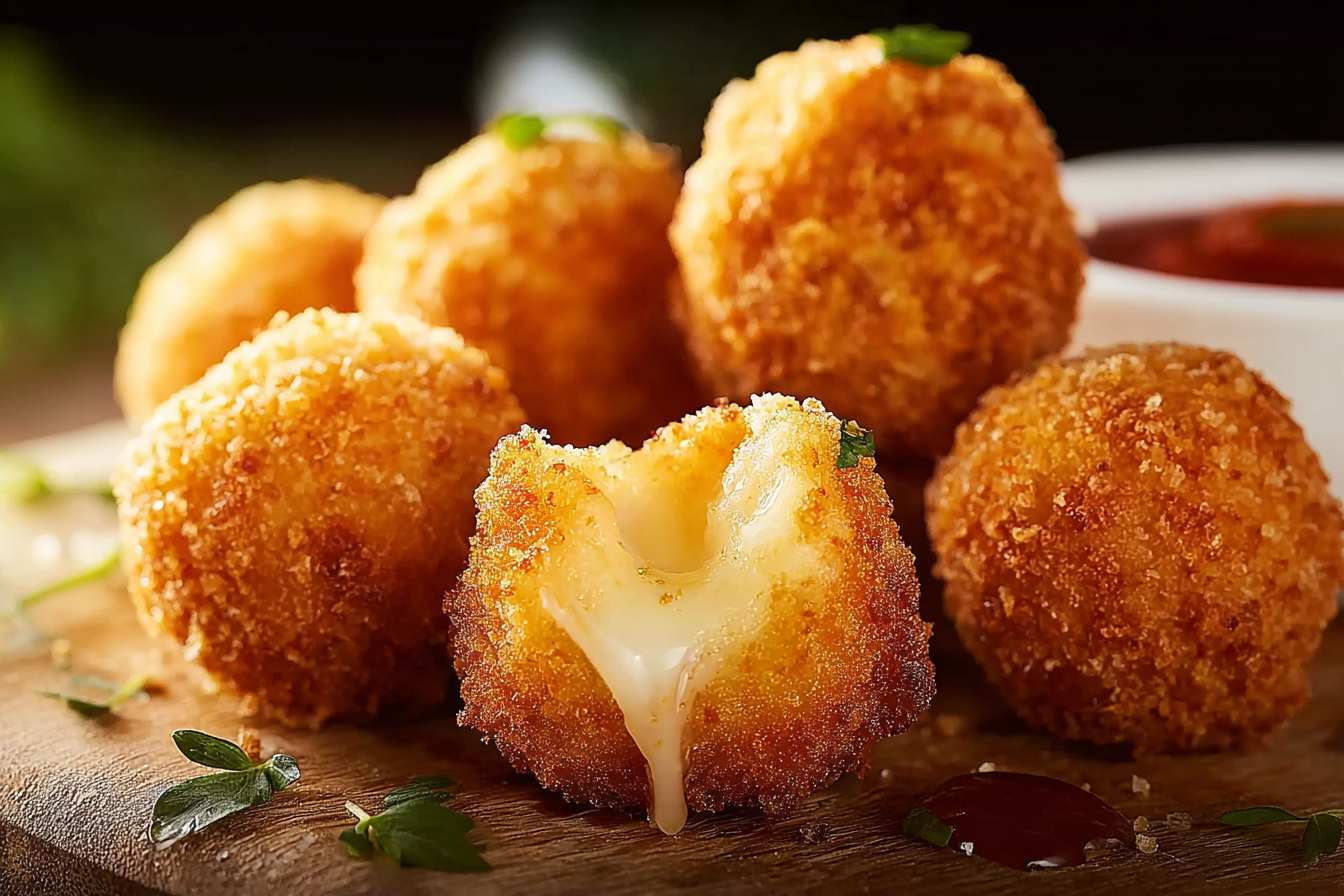Crispy Fried Cheese Balls are the ultimate snack for anyone who loves a crunchy bite followed by an explosion of gooey, melted cheese. These golden treats are beloved worldwide because they combine the irresistible texture of a crisp outer layer with the comforting softness of molten cheese at the center. At RecipesTasteful, this passion for creating cozy and family-friendly recipes has deep roots. Olivia, the founder, shares her love for cooking inspired by generations of home chefs who found joy in serving warm meals around the table. The About page tells the story of how she and her partner started RecipesTasteful with a mission to share dishes that bring people together, just like these cheese balls do.
In this guide, we will show you how to make crispy fried cheese balls from scratch, explore the science behind frying cheese perfectly without melting it all over the pan, and even discuss which cheese varieties create the most delicious results. Whether you are searching for easy crispy fried cheese balls or want to know why some recipes use flour while others skip it, this article covers it all.
Table of Contents
Table of Contents
Understanding Crispy Fried Cheese Balls
What Are Crispy Fried Cheese Balls
Crispy Fried Cheese Balls are small, round bites made from a delightful mixture of grated cheese, spices, flour, and sometimes eggs. Crispy Fried Cheese Balls are coated in breadcrumbs before being deep-fried to golden perfection. When done right, Crispy Fried Cheese Balls have a crunchy crust that gives way to a warm, gooey center. These snacks are often served as appetizers, party finger foods, or even as part of a comforting snack platter.
Across the globe, Crispy Fried Cheese Balls are known by different names. In some countries, they’re called mozzarella bites or queso frito. In others, they are simply referred to as Crispy Fried Cheese Balls. Regardless of the name, Crispy Fried Cheese Balls hold a universal appeal because they satisfy both texture and flavor cravings in one perfect bite.
Why Are Crispy Fried Cheese Balls So Popular
The popularity of Crispy Fried Cheese Balls comes from their simplicity and versatility. Crispy Fried Cheese Balls are incredibly easy to make with simple pantry staples like flour, eggs, breadcrumbs, and cheese. Crispy Fried Cheese Balls can also be customized endlessly. Whether you crave a spicy version, a milder cheesy flavor, or even vegan Crispy Fried Cheese Balls, there’s a recipe out there for you.
Crispy Fried Cheese Balls are ideal for parties, family gatherings, or quick weeknight snacks. You can prepare large batches of Crispy Fried Cheese Balls ahead of time, freeze them, and fry fresh batches when you need a crowd-pleaser. The convenience of Crispy Fried Cheese Balls makes them a go-to snack for many households worldwide.
The Role of Texture in Crispy Fried Cheese Balls
The key to the success of Crispy Fried Cheese Balls lies in their textural contrast. The crispy outside of Crispy Fried Cheese Balls paired with the soft, melted inside creates a delightful experience. To achieve this, preparation must focus on breading and frying techniques. If the coating on Crispy Fried Cheese Balls is too thin, cheese may leak out during frying. If the oil temperature isn’t right, Crispy Fried Cheese Balls might turn soggy instead of crispy.
By mastering a few simple techniques, anyone can create Crispy Fried Cheese Balls that rival those found at high-end restaurants. In the next section, we’ll break down the key ingredients that make Crispy Fried Cheese Balls irresistible.
Print
Crispy Fried Cheese Balls Recipe That’s Better Than Takeout
- Total Time: 55 minutes
- Yield: 24 cheese balls
- Diet: Vegetarian
Description
Crispy Fried Cheese Balls are golden, crunchy snacks filled with gooey melted cheese and flavored with a mix of spices. Perfect as an appetizer or party snack, these cheese balls are served hot with marinara sauce and fresh basil.
Ingredients
- 4 cups grated cheese or vegan cheese
- 2 eggs
- 4 tbsp all-purpose flour
- 2 tsp garlic powder
- 2 tsp onion powder
- 2 tsp oregano
- 1 tsp black pepper
- 1 tsp smoked paprika
- 1 tsp chili flakes
- 1 cup bread crumbs
- 6-8 cups vegetable oil
Instructions
- Line a baking tray with parchment paper and set aside.
- In a large bowl, combine grated cheese, eggs, flour, and all spices using a hand mixer until fully incorporated.
- Scoop approximately 2 tablespoons of the mixture and roll into small balls.
- Coat each cheese ball evenly in bread crumbs and place on the prepared tray.
- Refrigerate for 30–45 minutes to allow the cheese balls to firm up.
- Line another tray with paper towels for draining excess oil later.
- In a deep pot, heat 6–8 cups of vegetable oil to 350–355°F using a thermometer.
- Fry 4–5 cheese balls at a time until golden brown, about 30 seconds per side.
- Remove from oil and drain on the paper towel-lined tray.
- Serve immediately with marinara sauce and fresh basil.
Notes
- Chill the cheese balls thoroughly before frying to prevent them from falling apart.
- Use a thermometer to maintain oil temperature for perfect crispiness.
- For extra flavor, mix Parmesan cheese into the bread crumbs.
- Vegan cheese can be substituted for a plant-based version.
- Prep Time: 15 minutes
- Cook Time: 10 minutes
- Category: Appetizer
- Method: Frying
- Cuisine: American
Nutrition
- Serving Size: 2 cheese balls
- Calories: 210
- Sugar: 0.5g
- Sodium: 310mg
- Fat: 16g
- Saturated Fat: 8g
- Unsaturated Fat: 6g
- Trans Fat: 0g
- Carbohydrates: 12g
- Fiber: 0.5g
- Protein: 7g
- Cholesterol: 40mg
Ingredients for Crispy Fried Cheese Balls
Essential Ingredients and Why They Matter
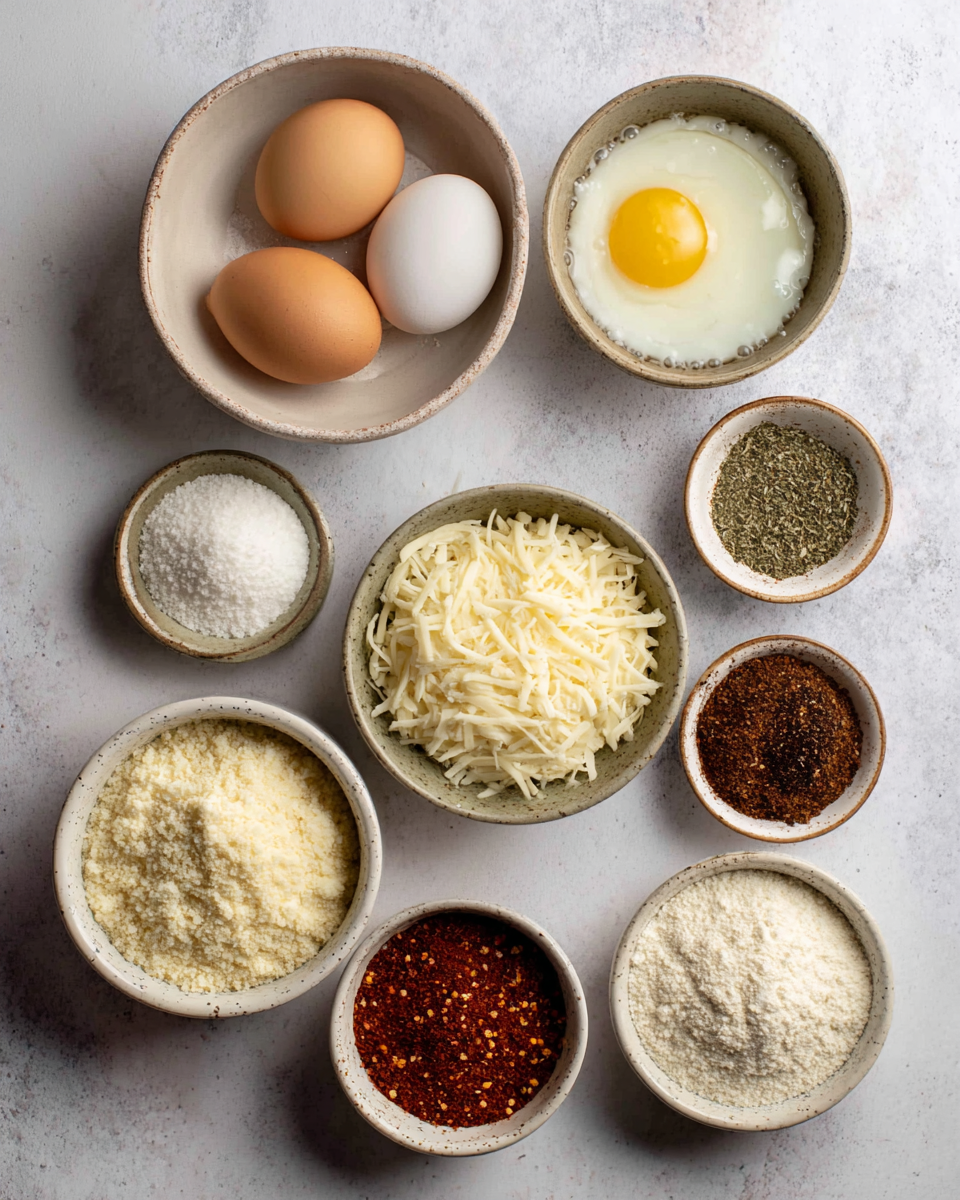
The success of crispy fried cheese balls starts with understanding the role each ingredient plays in the recipe. Every component, no matter how small, contributes to the overall flavor, texture, and structure of the snack.
Cheese or Vegan Cheese (4 cups grated)
The star of the show is, of course, the cheese. Grated cheese melts uniformly and combines easily with other ingredients to form a cohesive mixture. Mozzarella is often used for its stretchy, gooey texture when melted. However, cheddar adds a sharper flavor and a slightly firmer consistency. For those following a plant-based diet, vegan cheese made from cashews, almonds, or soy is an excellent substitute. The choice of cheese determines how gooey or firm your cheese balls will be after frying.
Eggs (2 large)
Eggs act as a binder. They help hold the grated cheese and flour together, preventing the balls from falling apart during frying. Eggs also contribute to a slightly richer taste and softer interior texture.
All-Purpose Flour (4 tablespoons)
Flour provides structure to the cheese balls. It absorbs moisture from the cheese and eggs, creating a dough-like consistency that is easy to shape. Skipping flour can lead to cheese balls that are too soft and prone to collapsing in the hot oil. For gluten-free versions, rice flour or chickpea flour works well.
Spices and Seasonings
The spices used in this recipe are garlic powder, onion powder, oregano, smoked paprika, chili flakes, black pepper, and a pinch of salt. Together, these create a flavor profile that is aromatic, savory, and slightly smoky with a hint of heat.
- Garlic powder and onion powder add depth.
- Oregano introduces a subtle herbal note.
- Smoked paprika contributes a mild smokiness and beautiful color.
- Chili flakes bring a gentle kick for those who enjoy a bit of spice.
Breadcrumbs (1 cup)
Breadcrumbs create the iconic crispy outer layer. Panko breadcrumbs are especially effective because they are coarser and yield a crunchier crust. Regular breadcrumbs also work for a more uniform coating. For gluten-free diets, crushed cornflakes or almond meal can be used.
Vegetable Oil (6 to 8 cups)
Deep-frying requires a generous amount of oil. Vegetable oil is ideal because of its high smoke point and neutral flavor, ensuring the cheese balls fry evenly without imparting any unwanted taste.
The Importance of Ingredient Quality
The quality of the ingredients directly impacts the taste and texture of your cheese balls. Freshly grated cheese melts more smoothly than pre-shredded cheese, which often contains anti-caking agents that can interfere with melting. Fresh spices provide a more vibrant flavor compared to older, stale seasonings. Even the type of breadcrumbs matters; stale or low-quality ones may absorb too much oil and turn soggy.
By paying attention to these details, you set yourself up for success before you even start mixing.
Step-by-Step Preparation of Cheese Balls
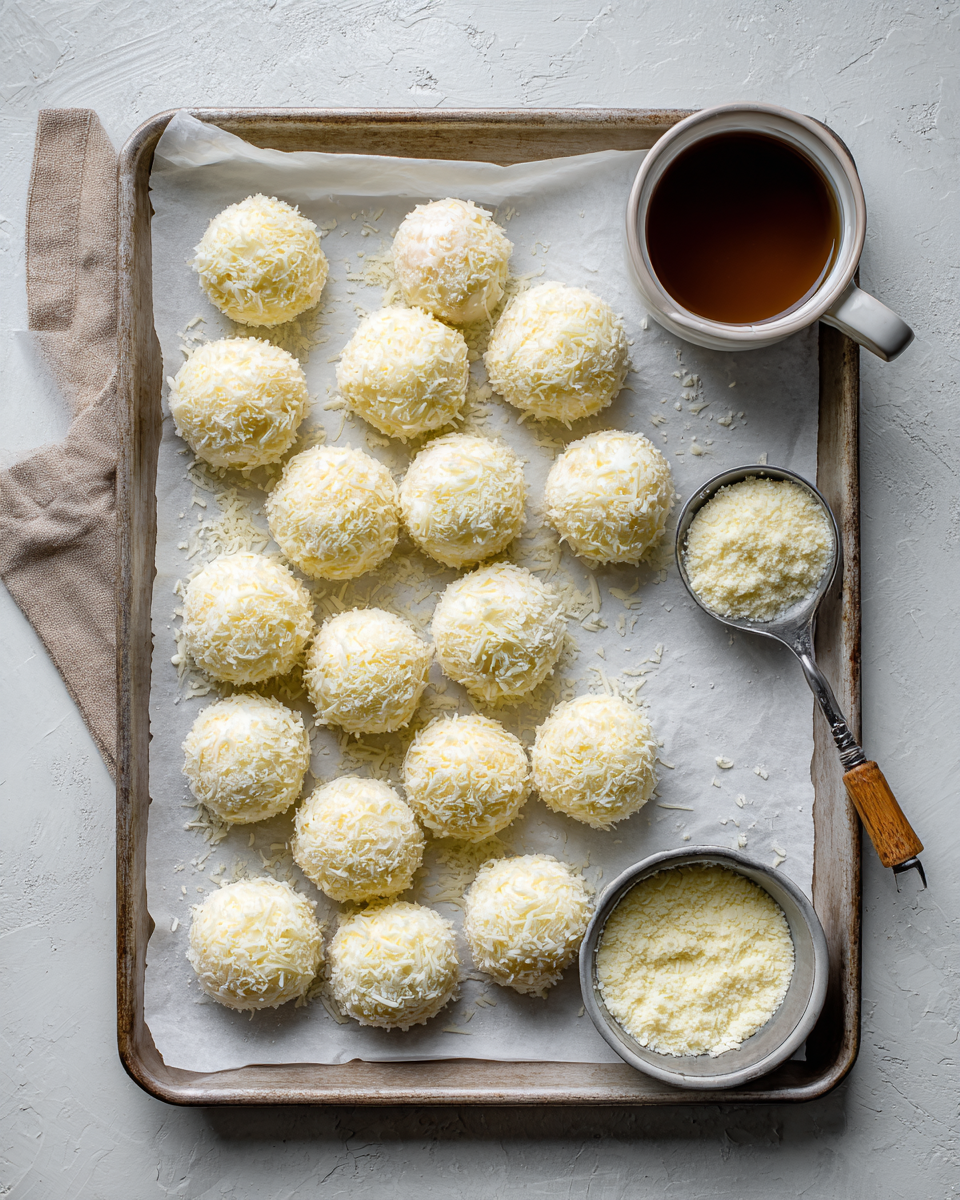
Mixing the Ingredients
To begin, line a baking tray with parchment paper and set it aside. In a large mixing bowl, combine grated cheese, eggs, flour, and all the spices. Using a hand mixer or a wooden spoon, mix until the ingredients come together into a thick, pliable dough. The mixture should be slightly sticky but firm enough to hold its shape when pressed together.
Shaping the Cheese Balls
Scoop out approximately two tablespoons of the mixture and roll it gently between your palms to form small, even balls. Each ball should be uniform in size to ensure they cook evenly during frying. Place the formed balls on the lined baking tray.
Coating with Breadcrumbs
Roll each ball in the breadcrumbs until fully coated. For an extra crispy crust, you can double coat them. Dip the ball in a beaten egg, then roll it in breadcrumbs again for a second layer. This technique creates a thicker barrier that protects the cheese from leaking out during frying.
Chilling Before Frying
Once coated, refrigerate the cheese balls for 30 to 45 minutes. Chilling solidifies the fat in the cheese and firms up the mixture, which prevents the balls from falling apart or bursting open in the hot oil.
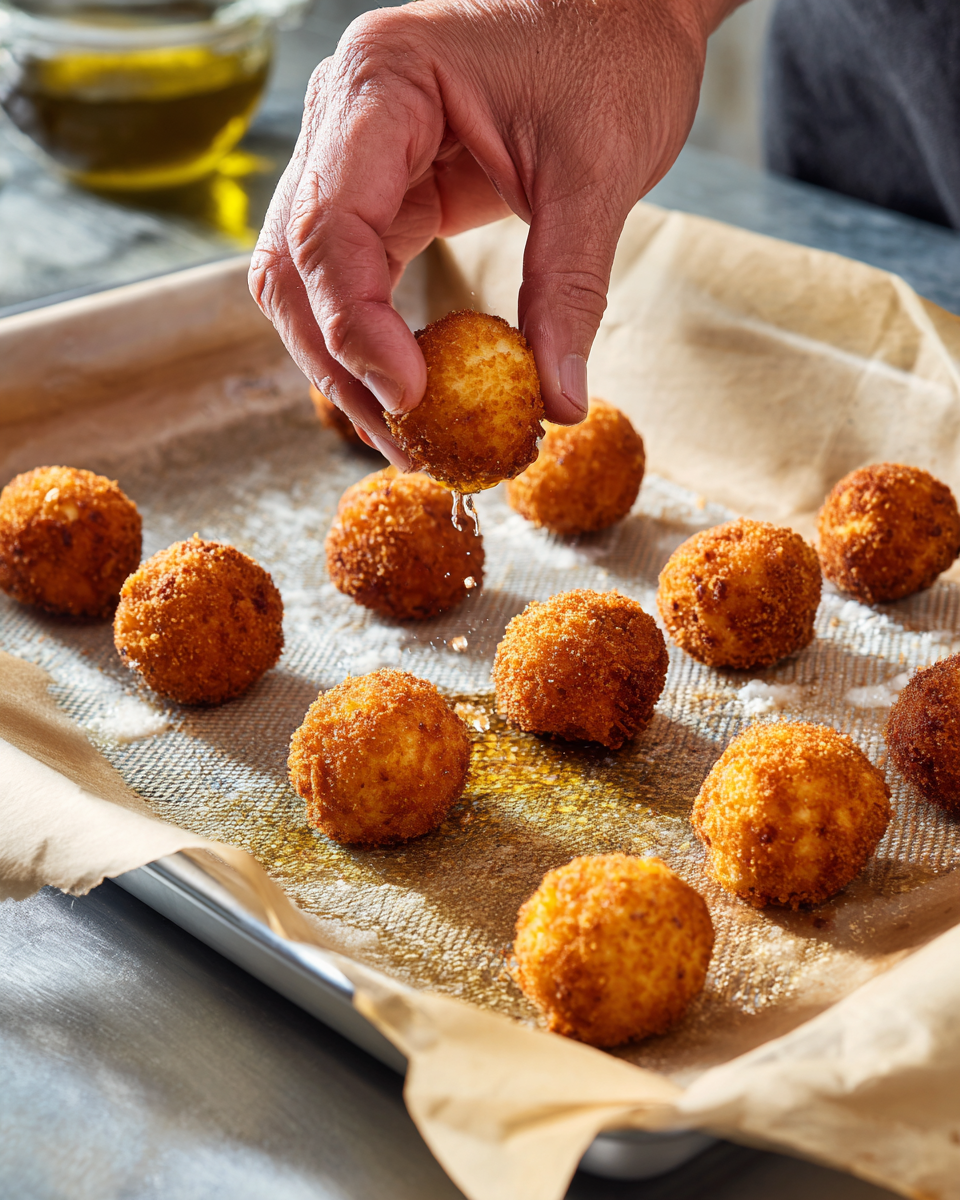
Mastering the Frying Process
Choosing the Right Oil and Temperature
Pour six to eight cups of vegetable oil into a large, deep pot. The oil depth should be about two to three inches to allow the cheese balls to float freely. Heat the oil to 350 to 355 degrees Fahrenheit, using a deep-fry or candy thermometer for accuracy.
Maintaining the correct temperature is critical. If the oil is too cool, the cheese balls will absorb excess oil and become greasy. If too hot, the outside will brown too quickly, leaving the center cold and unmelty.
Frying in Batches
Fry four to five cheese balls at a time to avoid overcrowding the pot, which can cause the oil temperature to drop. Fry each batch for about 30 seconds on each side, or until they turn golden brown. Use a slotted spoon to transfer them to a paper towel-lined tray to drain any excess oil.
Serving Immediately
Crispy fried cheese balls are best enjoyed hot when the crust is still crunchy and the cheese inside is deliciously gooey. Serve them with marinara sauce, ranch dressing, or your favorite dip. Fresh basil or parsley makes an excellent garnish for a pop of color and flavor.
Exploring Cheese Options for Perfect Crispy Fried Cheese Balls
Which Cheese is Best for Crispy Fried Cheese Balls
When making Crispy Fried Cheese Balls, mozzarella remains the most popular choice for its classic stretchy melt. Mozzarella gives Crispy Fried Cheese Balls that signature pull and gooey center everyone loves. Cheddar is another excellent option for Crispy Fried Cheese Balls because it offers a sharper taste and a more robust structure, which helps prevent the cheese from oozing out too quickly during frying. Gouda adds a creamy richness to Crispy Fried Cheese Balls, while using a blend of cheeses creates a more complex flavor profile that elevates these snacks.
For vegan Crispy Fried Cheese Balls, cashew-based cheeses or soy mozzarella alternatives are fantastic. These vegan substitutes melt beautifully and still provide the gooey center that makes Crispy Fried Cheese Balls irresistible.
Experimenting with Flavors in Crispy Fried Cheese Balls
To add a fresh twist to your Crispy Fried Cheese Balls, mix finely chopped herbs like parsley or chives directly into the cheese mixture. For those who love spice, diced jalapeños or pepper jack cheese will bring a pleasant heat that complements the richness of Crispy Fried Cheese Balls. The beauty of Crispy Fried Cheese Balls lies in their versatility—you can tailor the filling to suit any palate.
Serving Suggestions and Dips for Crispy Fried Cheese Balls
Classic Dips That Pair Perfectly with Crispy Fried Cheese Balls
One of the joys of Crispy Fried Cheese Balls is their adaptability when it comes to serving options. Marinara sauce remains the simplest yet most popular dip for Crispy Fried Cheese Balls. The tangy tomato flavor balances the richness of melted cheese beautifully. Ranch dressing is another crowd favorite for Crispy Fried Cheese Balls, adding a creamy, herby note that pairs wonderfully with the crispy coating.
For a touch of heat, serve Crispy Fried Cheese Balls with sriracha mayo or chipotle aioli. These spicy dips elevate Crispy Fried Cheese Balls, providing a gentle heat that lingers pleasantly. Honey mustard is a sweet and tangy alternative that complements Crispy Fried Cheese Balls for those preferring a lighter option.
If you’re exploring international flavors, tzatziki or a mild curry sauce brings a refreshing twist to Crispy Fried Cheese Balls. Whether served as an appetizer, snack, or party finger food, Crispy Fried Cheese Balls always deliver a satisfying experience with the right dip.
Creative Presentation Ideas
Presentation matters, especially when serving cheese balls at gatherings or parties. Arranging them in a circular pattern on a large platter with small dipping bowls in the center creates a visually appealing snack tray. Alternatively, you can serve each cheese ball on a skewer with a cherry tomato or olive for a fun, bite-sized appetizer.
For children’s parties, consider pairing the cheese balls with colorful vegetables like baby carrots and cucumber sticks to encourage balanced snacking.
Looking for inspiration? Try Chicken Zucchini Bake for a healthier main dish to pair with your cheesy appetizer.
Storage, Reheating, and Meal Prep Tips
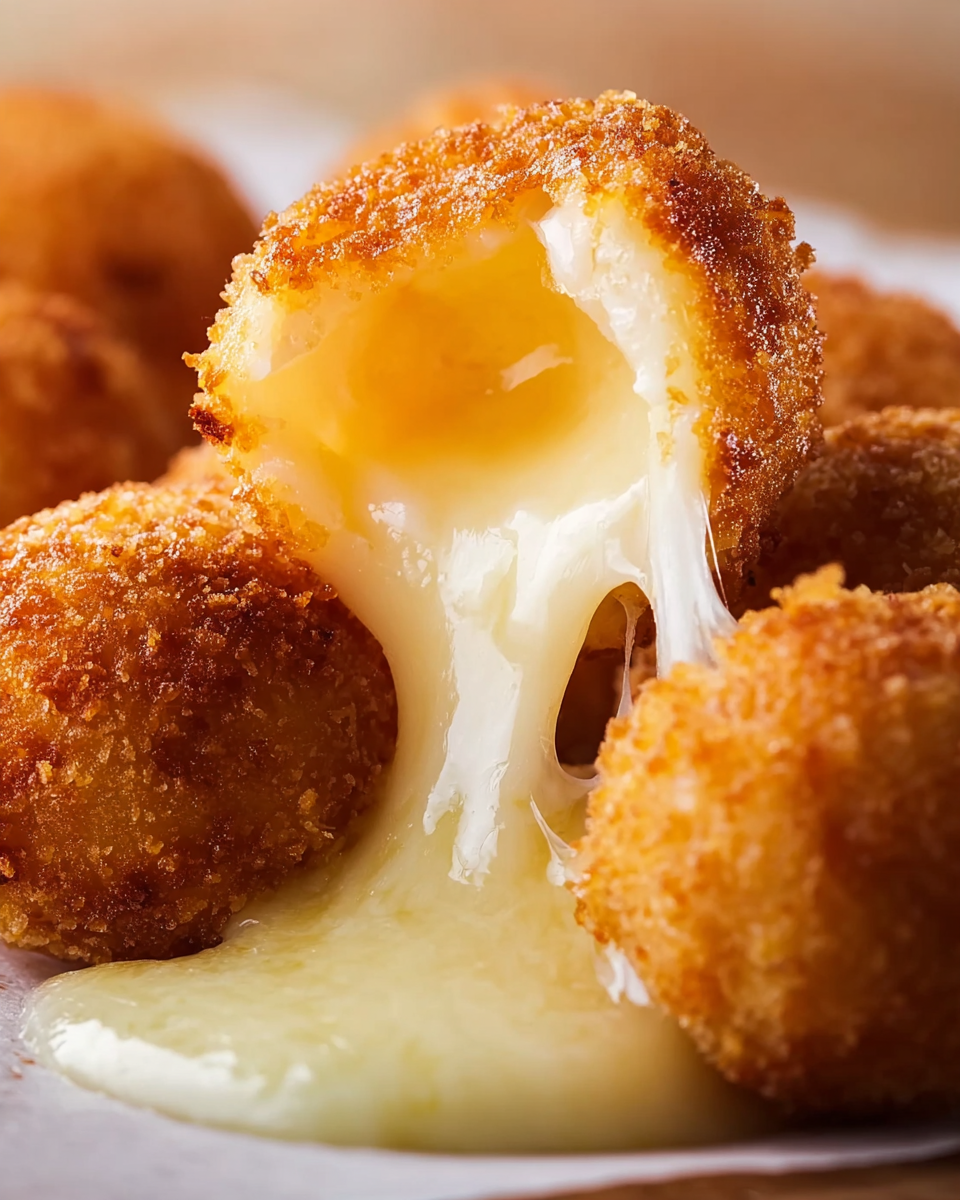
How to Store Leftover Cheese Balls
If you happen to have leftovers, proper storage is key to maintaining their quality. Place the cooled cheese balls in an airtight container lined with paper towels to absorb any excess moisture. They can be stored in the refrigerator for up to three days.
For longer storage, freeze the cheese balls before frying. Arrange them on a baking sheet in a single layer and freeze until solid. Once frozen, transfer them to a freezer-safe bag or container. They can be stored for up to two months. When ready to cook, fry them directly from frozen without thawing to prevent sogginess.
Reheating Without Losing Crispiness
The best method for reheating fried cheese balls is using an oven or air fryer. Preheat the oven to 375 degrees Fahrenheit and bake for five to seven minutes until heated through. An air fryer can reheat them even faster in about three to five minutes. Avoid microwaving as it tends to make the coating soggy and the interior rubbery.
Preparing Cheese Balls Ahead of Time
Meal prepping cheese balls is a time-saving strategy for busy households. You can prepare large batches of the cheese mixture, shape the balls, and store them in the freezer. When guests arrive or snack cravings strike, you only need to fry them for a few minutes to enjoy a fresh, homemade treat.
Don’t miss our Garlic Parmesan Cheeseburger Bombs for another make-ahead snack idea perfect for parties.
Regional Variations and Creative Twists
Global Takes on Fried Cheese Snacks
Cheese lovers across the world have put their own spin on fried cheese balls. In Italy, mozzarella in carrozza is a popular street food where mozzarella is sandwiched between bread, battered, and fried. In Brazil, pão de queijo takes a different route with small baked cheese breads made with tapioca flour. Meanwhile, Greece offers saganaki, which features cheese pan-fried until golden without any coating.
Each version demonstrates how versatile fried cheese snacks can be and highlights how you can infuse local flavors into your own batch of crispy fried cheese balls.
Creative Twists for Homemade Versions
At home, try mixing different cheeses like smoked gouda and pepper jack for a smoky-spicy flavor combination. Adding chopped herbs such as basil or parsley to the cheese mixture gives a fresh aroma. For a sweet and savory surprise, fold in tiny pieces of cooked bacon or caramelized onions.
You can even experiment with coatings. Crushed cornflakes or seasoned panko breadcrumbs bring an extra crunch, while a dusting of parmesan cheese on the exterior adds umami.
Discover great ideas like Crispy Air Fryer Sliced Potatoes for another snack that’s as crispy and addictive as cheese balls.
Healthier Alternatives and Baking Methods

Baking Cheese Balls Instead of Frying
For those looking to enjoy cheese balls with less oil, baking is an excellent option. Preheat your oven to 400 degrees Fahrenheit. Place the coated cheese balls on a parchment-lined baking tray and spray them lightly with olive oil. Bake for 12 to 15 minutes, turning halfway through to ensure even browning.
The result is a slightly lighter snack with a crunchy exterior, though it may not reach the exact crispiness of deep frying.
Air Fryer Method for Crispy Cheese Balls
An air fryer offers another healthier alternative. Set your air fryer to 375 degrees Fahrenheit and arrange the cheese balls in a single layer. Cook for 8 to 10 minutes, shaking the basket halfway through. This method uses minimal oil yet delivers a satisfyingly crunchy crust.
Check out Golden Potato and Balsamic Torte for a baked alternative with gourmet appeal.
Common Mistakes to Avoid When Making Cheese Balls
Using the Wrong Cheese
Not all cheeses are created equal when it comes to frying. Cheeses with high moisture content like fresh mozzarella can leak excessively if not combined with binding agents. Instead, opt for semi-hard varieties or use a blend for better control over melting.
Overcrowding the Fryer
Placing too many cheese balls into the oil at once lowers the temperature, leading to soggy and unevenly cooked results. Always fry in small batches to maintain consistent heat.
Skipping the Chilling Step
This step might seem unnecessary but is crucial. Chilling firms up the cheese balls, reducing the risk of them breaking apart or leaking in the oil.
Neglecting the Oil Temperature
Oil that is too hot burns the coating before the cheese inside melts. Oil that is too cool leads to greasy, heavy snacks. Using a thermometer ensures you hit the ideal frying range of 350 to 355 degrees Fahrenheit.
Pairing Cheese Balls with Drinks and Meals
Perfect Drinks to Accompany Cheese Balls
Pairing your crispy fried cheese balls with the right drink can turn a simple snack into an elevated dining experience. For casual gatherings, a light, citrusy soda or homemade lemonade balances the richness of the cheese. Sparkling water with a splash of lime is also refreshing.
For adults, pairing with drinks like chilled white wine such as Sauvignon Blanc or a fruity rosé enhances the cheesy, crispy flavors. Light beers and lagers also work well, as their mild bitterness cuts through the heaviness of the fried snack.
Complementary Meals to Serve Alongside
Crispy fried cheese balls shine as appetizers but can also complement full meals. Serve them with creamy pasta dishes, hearty soups like tomato basil, or fresh green salads for a contrast in textures. For a comfort food spread, pair them with sliders, chicken wings, and a platter of roasted vegetables.
Nutritional Insights and Customizations
Calorie and Nutrient Breakdown
A typical serving of crispy fried cheese balls contains approximately 300 to 400 calories, depending on the size and type of cheese used. Each serving provides a high amount of protein from the cheese and eggs, but also includes fats from both the cheese and frying oil. Carbohydrates come primarily from the flour and breadcrumbs.
To make them lighter, opt for baking instead of deep frying and use low-fat cheese. Substituting regular breadcrumbs with whole wheat or almond flour crumbs also adds fiber and nutrients.
Dietary Modifications for Every Lifestyle
For gluten-free diets, use chickpea flour and gluten-free breadcrumbs. For a vegan version, swap out dairy cheese for plant-based alternatives and replace eggs with a flaxseed or chia seed gel. For low-carb diets, consider using crushed pork rinds or almond meal as a coating instead of breadcrumbs.
Pro Tips from Chefs and Home Cooks
Professional Tips for Perfect Results
Professional chefs recommend using freshly grated cheese rather than pre-shredded varieties because the latter often contains anti-caking agents that affect melting. Another expert tip is to double-coat the cheese balls with breadcrumbs to create a thicker shell that prevents cheese leakage during frying.
Chilling for longer periods, even up to a few hours, helps maintain the shape of the cheese balls in the fryer. When frying, use a thermometer to keep the oil at the right temperature consistently, adjusting heat as necessary to avoid burning or undercooking.
Home Cook Hacks for Easier Preparation
Many home cooks suggest preparing the cheese mixture and forming the balls ahead of time, then freezing them. This makes it easy to fry only the amount needed, directly from frozen. Others recommend using an air fryer as a fuss-free way to enjoy crispy cheese balls without the cleanup of deep frying.
Serving Cheese Balls for Special Occasions
Making Cheese Balls the Star of Your Party
Crispy fried cheese balls are an excellent addition to any party menu. Their bite-sized nature makes them perfect finger food for guests to enjoy while mingling. For a visually appealing presentation, serve them on a tiered platter with multiple dipping sauces like marinara, spicy ranch, and honey mustard arranged around the base. This allows guests to mix and match flavors according to their preferences.
At family gatherings, cheese balls can serve as a fun activity for kids too. Set up a “build your own cheese ball” station where children can roll the prepared cheese mixture into balls and coat them in different toppings such as crushed pretzels, sesame seeds, or colorful panko crumbs before an adult fries them.
Holiday Variations and Themes
During the holiday season, add festive flair by incorporating herbs like rosemary or thyme into the cheese mixture. Shaping the balls into mini wreaths or serving them with red and green garnishes creates a seasonal touch. For Halloween, you can shape them slightly irregularly and serve with a dark dipping sauce to create a “spooky” effect.
Pairing with Side Dishes for a Full Meal
Turning Cheese Balls into a Main Course
Although cheese balls are often served as appetizers, pairing them with hearty side dishes can transform them into a satisfying main meal. Pair them with a fresh garden salad dressed in a light vinaigrette to balance the richness. A creamy tomato soup or roasted vegetable bisque also complements the gooey texture of the cheese inside.
For a heavier meal, consider serving cheese balls alongside garlic butter pasta or roasted potatoes. These pairings work especially well when serving guests who appreciate comfort food classics.
Light Sides for a Balanced Plate
For those seeking lighter options, pair cheese balls with steamed green beans, grilled zucchini, or a quinoa salad. These sides add nutritional value and ensure the meal is not overly heavy. Adding fresh citrus slices to the table can also help cleanse the palate between bites.
How to Scale the Recipe for Large Gatherings
Adjusting Quantities for Big Batches
When preparing crispy fried cheese balls for large groups, scaling the recipe requires more than simply doubling or tripling the ingredients. To maintain consistent quality, mix ingredients in batches rather than one massive bowl. This prevents uneven seasoning and ensures the cheese balls hold their shape.
For example, instead of making one giant bowl for 50 cheese balls, divide the recipe into three smaller bowls, each for about 15 to 20 cheese balls. This approach makes the mixture easier to handle and reduces the risk of overmixing.
Tips for Efficient Frying
To keep up with high demand, use multiple frying stations or a deep fryer with a larger capacity. Keep fried cheese balls warm by placing them on a wire rack in a low oven set to 200 degrees Fahrenheit while you continue frying the next batches. This prevents them from becoming soggy on the bottom and ensures they stay crispy until serving.
Common Questions About Storage and Leftovers Expanded
Can Cheese Balls Be Frozen After Frying
Yes, fried cheese balls can be frozen, although they are best enjoyed fresh. To freeze, allow them to cool completely after frying. Place them on a baking sheet in a single layer and freeze until solid. Transfer them to a freezer-safe bag or container and store for up to two months. Reheat directly from frozen in an oven or air fryer for best results.
How Long Do Cheese Balls Last in the Refrigerator
Uncooked cheese balls can last in the refrigerator for up to three days if stored properly in an airtight container. Once fried, they should be consumed within two to three days for optimal taste and texture.
Best Way to Reheat Cheese Balls Without Losing Crispiness
Reheat cheese balls in an oven preheated to 375 degrees Fahrenheit for five to seven minutes or until warmed through. An air fryer is even more effective, taking only three to five minutes at 350 degrees Fahrenheit to restore their crispy exterior. Avoid microwaving as it tends to make the coating soggy.
Flavor Variations and International Inspiration
Unique Flavor Additions to Try
For those seeking to experiment, there are endless ways to customize cheese balls. Adding finely chopped jalapeños brings a spicy kick, while sun-dried tomatoes offer a tangy, savory note. A sprinkle of fresh herbs like parsley or thyme can add a burst of freshness.
Infusing the breadcrumb coating with spices like curry powder, cayenne, or even grated parmesan cheese gives the exterior an extra layer of flavor.
International Versions for Creative Home Cooks
In Japan, korokke takes the concept further by incorporating mashed potatoes and meat with cheese. India offers paneer pakoras, which are cubes of paneer cheese coated in chickpea flour batter and deep-fried. In Eastern Europe, fried cheese is often served with lingonberry jam, creating a sweet and savory contrast.
Drawing inspiration from these international versions allows home cooks to tailor their cheese balls to different cuisines and taste preferences.
Cheese Ball Presentation for Elegant Events
Elevating Cheese Balls for Formal Occasions
While cheese balls are often seen as casual snacks, they can easily be transformed into elegant appetizers suitable for weddings, galas, or dinner parties. Serve them on individual spoons with a dollop of flavored aioli or balsamic glaze underneath. Another option is to skewer them with cherry tomatoes and basil leaves to create a sophisticated hors d’oeuvre.
Plating them in small ceramic bowls with contrasting sauces in artistic patterns can also give a fine dining touch. Using microgreens as garnish adds both color and elegance.
Creating a Cheese Ball Grazing Board
For a more relaxed yet still upscale presentation, arrange the cheese balls as part of a grazing board. Surround them with cured meats, assorted cheeses, crackers, olives, and fresh fruit. This setup allows guests to build their own flavorful bites and makes for an impressive centerpiece.
Homemade vs. Store-Bought Cheese Balls – A Comparison
Taste and Texture Differences
Homemade cheese balls offer superior freshness and flavor because you control the ingredients. Freshly grated cheese melts more smoothly and tastes creamier compared to the pre-processed cheese often used in frozen store-bought varieties. Homemade coatings tend to be crispier as they are fried or baked immediately before serving, while store-bought versions can have a slightly chewy exterior after reheating.
Cost and Convenience Considerations
While store-bought cheese balls save time and effort, they often come at a higher price per serving compared to making them at home. Preparing cheese balls yourself allows you to make larger quantities for a fraction of the cost and customize them with your preferred ingredients.
For busy households, keeping a homemade batch frozen and ready to fry offers the best of both worlds—convenience without sacrificing quality.
Tips for Making Cheese Balls Ahead of Time
Preparing in Advance for Stress-Free Cooking
One of the greatest advantages of crispy fried cheese balls is how well they lend themselves to advance preparation. You can mix the cheese, spices, flour, and eggs, shape the balls, and store them in the refrigerator for up to two days before frying. This approach allows you to prepare for parties or family dinners without the pressure of last-minute cooking.
For longer storage, freezing is the best option. Shape the cheese balls and place them on a baking tray lined with parchment paper. Freeze them in a single layer to prevent sticking. Once frozen, transfer the cheese balls into an airtight freezer-safe bag or container. They will keep their quality for up to two months.
Cooking Directly from Frozen
When ready to serve, there is no need to thaw frozen cheese balls. Fry them directly from frozen in preheated oil, adding an extra 30 seconds to the frying time. For oven or air fryer methods, preheat to the recommended temperature and bake until heated through and golden.
Kid-Friendly Versions and Lunchbox Ideas
Making Cheese Balls Appealing for Kids
Cheese balls are naturally popular with children because of their cheesy interior and crispy exterior. To make them more exciting, you can shape them into fun sizes—mini cheese balls for tiny hands or slightly larger ones for older kids. Using mild cheeses such as mozzarella or Colby ensures flavors stay kid-friendly.
Adding finely grated vegetables like carrots or zucchini to the mixture can sneak in extra nutrition without altering taste significantly. Coating them with colorful seasoned breadcrumbs, such as those made with beetroot or spinach powder, adds visual appeal.
Including Cheese Balls in Lunchboxes
Cheese balls can be a creative addition to school lunchboxes. Bake them instead of frying for a less oily version that holds up better at room temperature. Pair them with small containers of marinara or ranch dressing for dipping. Including a few fresh fruit slices and a handful of nuts alongside creates a balanced, child-friendly meal.
Adapting Cheese Balls for Special Diets
Gluten-Free Cheese Balls
To make gluten-free cheese balls, replace all-purpose flour with chickpea or rice flour. Substitute regular breadcrumbs with gluten-free versions or crushed gluten-free crackers. These changes maintain a similar texture without compromising on taste.
Vegan Cheese Balls
For vegan cheese balls, use plant-based cheese that melts well and replace eggs with a flaxseed or chia seed mixture. These alternatives bind the ingredients effectively and create a satisfying, gooey interior when cooked.
Low-Carb Cheese Balls
For those following a low-carb or keto diet, swap breadcrumbs for crushed pork rinds or almond flour. This creates a crunchy coating while keeping carbohydrate content minimal.
Creative Cheese Ball Garnishes and Plating Tips
Elevating the Visual Appeal of Cheese Balls
Plating is an essential element, especially when serving cheese balls at formal gatherings or special occasions. Garnishing with finely chopped herbs like parsley, cilantro, or chives adds a pop of color against the golden crust. Lightly dusting the serving plate with smoked paprika or grated parmesan creates a subtle aromatic layer that enhances presentation.
For a rustic look, serve cheese balls in a wooden bowl lined with parchment paper. For an elegant touch, use small ramekins or ceramic spoons, each holding a single cheese ball with a drizzle of sauce beneath it. Microgreens, edible flowers, and citrus zest can also turn a simple snack into a gourmet appetizer.
Plating for Sharing and Individual Portions
When serving family-style, arrange cheese balls in a pyramid on a large platter, placing small bowls of dipping sauces like marinara, aioli, and honey mustard around the edges. For individual servings, skewer cheese balls with bamboo picks and stand them upright in a bed of rock salt or beans to keep them stable and appealing.
Turning Cheese Balls Into Party Favors or Gifts
Cheese Balls as Edible Party Favors
Crispy fried cheese balls can be packaged as creative party favors for guests to take home. Once cooled, place them in decorative paper cups and seal them in clear treat bags tied with ribbon. Add a small label with reheating instructions to ensure guests can enjoy them later with the same crispy texture.
Gifting Homemade Cheese Balls
For holidays or special occasions, consider gifting frozen, ready-to-fry cheese balls. Arrange them neatly in a freezer-safe container with parchment paper between layers. Include a handwritten note with cooking instructions and dipping sauce suggestions. This thoughtful gesture combines convenience with a personal touch.
Ultimate Serving Guide for Different Occasions
Casual Family Nights
Serve cheese balls alongside homemade pizza, garlic bread, and a fresh salad for a comfort food feast. Kids and adults alike will enjoy dipping them in various sauces, making it a fun interactive dining experience.
Elegant Dinners
For more refined occasions, pair cheese balls with a chilled glass of white wine and a light starter such as a caprese salad. Present them as small bites between courses to delight guests with their surprising texture and flavor.
Large Gatherings and Buffets
Cheese balls are perfect for buffets because they hold their shape well and can be kept warm in a chafing dish. Arrange them with toothpicks for easy grabbing and offer an assortment of sauces to suit every palate.
Conclusion and Final Thoughts
Crispy fried cheese balls are more than just a snack; they’re a versatile dish that fits into nearly every occasion, from casual family dinners to sophisticated gatherings. Their perfect balance of a crunchy exterior and molten cheesy interior makes them universally loved. By mastering the preparation techniques, experimenting with flavors, and considering dietary adaptations, you can make cheese balls that cater to every taste and preference.
Whether baked, air-fried, or traditionally deep-fried, these delightful bites never fail to impress. Keep a batch ready in your freezer, and you’ll always have a crowd-pleaser on hand for unexpected guests or snack cravings.
With their ease of customization and universal appeal, crispy fried cheese balls deserve a permanent spot in your recipe collection.
Frequently Asked Expert Questions About Technique
Is It Possible to Bake Cheese Balls Without Losing Crispiness
Yes, but the result will be slightly different from frying. To maximize crispiness in the oven, preheat a baking sheet and spray the cheese balls lightly with cooking oil before baking. Turning them halfway through cooking ensures even browning.
What Is the Best Oil for Frying Cheese Balls
Oils with high smoke points and neutral flavors work best. Vegetable oil, canola oil, and sunflower oil are excellent choices. Avoid olive oil or butter as they tend to burn at the temperatures needed for frying.
How Do I Keep the Cheese From Oozing Out
Expert chefs recommend double breading as the most reliable method. After shaping and coating the cheese balls once, dip them in beaten egg again and roll in breadcrumbs a second time. This thicker crust acts as a barrier during frying.

